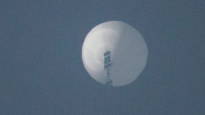The Chinese balloon spotted in the Montana sky is the size of three buses. The effects of an object flying higher than airplanes on world politics can be even greater than this, estimates our Asia correspondent Kirsi Crowley.
13:45•Updated 13:46
BEIJING Was the balloon just an unfortunate mistimed accident that was harnessed in the US for a sleazy campaign to smear China? Or will China show the US that it can monitor ballistic missile silos in Montana whenever it likes.
At least the moment was bad. US Secretary of State Antony Blinken canceled his planned arrival in China on Sunday because of the balloon. He accused China of an irresponsible act. Blinken’s visit would have been the first visit by a US executive to China in five years.
The purpose was to discuss many issues affecting the relations between the two countries, from Ukraine to microchip sanctions, Taiwan and the growth of China’s military power in the South China Sea.
The United States has been diligently and visibly putting together an anti-China front recently. Its defense minister Lloyd Austin last week sought stronger military partnerships in China’s neighboring regions in South Korea and the Philippines. Secretary General of NATO Jens Stoltenberg also visited South Korea and Japan. The China threat was discussed in all visits. The United States has also actively sought countries on the microchip front against China.
China, on the other hand, vowed cooperation with Russia this Saturday and said that the relations between the two countries have deepened even further. Deputy Foreign Minister Ma Zhaoxu met the Russian Foreign Minister Sergei Lavrov in Moscow.
Blinken’s arrival in Beijing was supposed to show at least that the dialogue between the United States and China is still open. Now, the balloon’s surprise appearance over the United States for days has taken away this opportunity. At least this is now, according to the United States, the reason for canceling the visit.
According to China, it is a weather observation balloon that lost its route due to air currents and is not obeying guidance. In the United States, it is estimated that the balloon would possibly monitor ballistic missile silos located in Montana.
It is still not clear what is actually inside the balloon and whether it can do anything better than the existing reconnaissance satellites.
Based on its output, China has not necessarily wanted a new dispute.
Former Foreign Minister Wang Yi apologized for the damage to Antony Blinken on the phone and hoped to maintain the conversation connection.
According to China, the United States hijacked the balloon as part of a campaign against China. Whether it turns out to be a harmless weather balloon or a high-tech espionage company, the opportunity to patch up superpower relations has now been lost, at least for a while. Even the strangest cases seem to be the reasons for the dispute.
